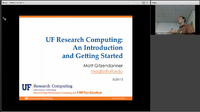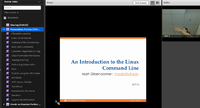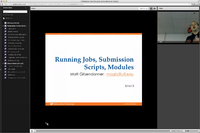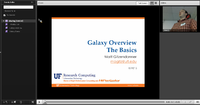Difference between revisions of "Training"
| Line 38: | Line 38: | ||
*'''Galaxy Overview: The Basics''' | *'''Galaxy Overview: The Basics''' | ||
**Download [[Media:Galaxy_Overview.pdf|the slides]] from the presentation. | **Download [[Media:Galaxy_Overview.pdf|the slides]] from the presentation. | ||
| − | **[[ | + | **[[Galaxy_Basics|View a recording of the session]] [[Image:Galaxy_video.png|200px|link=Galaxy_Basics]] |
*'''Next Generation Sequencing Data Techniques: Reference-Based Mapping and de Novo Assembly''' | *'''Next Generation Sequencing Data Techniques: Reference-Based Mapping and de Novo Assembly''' | ||
Revision as of 15:36, 26 September 2013
At the UF Research Computing we strive to make our resources accessible, efficient, and easy to use. An important part of the effective research computing is the knowledge of how to apply the many available tools in a productive and efficient manner. Comprehensive and clear documentation, well-structured training, and individual help we provide are all means of achieving that goal. We run a series of training sessions and tutorials during each semester of the school year and in the Summer. These sessions are mostly oriented towards biological computing, but many of them reflect the aspects of the HPC resources that apply to other disciplines as well. See the Training Category pages for the records of the previous sessions, to download presentations and handouts, and to propose topics of interest to you.
The previous training series included 'Introduction to UFRC', 'Introduction to Linux Command Line and Job Submission Scripts', 'Introduction to Galaxy at UFRC', 'Running phylogenetics applications at UFRC', 'Modules and basic submission scripts', 'Working with NGS data', 'Introduction to Perl', 'Perl in practice', 'Statistical analysis at UFRC', 'R and SAS in practice', and 'Parallel Computing'.
Please see the schedule of training sessions and other Research Computing events below. Please check the calendar before a session as the schedule may change.
Resources
The most recent set of slides and handouts from the training sessions are listed below. Updated copies of training material will be posted shortly before each session.
- UF Research Computing: An Introduction and Getting Started
- Download the slides from the presentation.
- View a recording of the session

- An Introduction to the Linux Command Line
- Download the slides from the presentation.
- Download the handout with the exercises
- Download an example Linux cheat sheet.
- View a recording of the session

- Running Jobs, Submission Scripts, Modules
- Download the slides from the presentation.
- Download a zip file with the example scripts.
- View a recording of the session

- Galaxy Overview: The Basics
- Download the slides from the presentation.
- View a recording of the session

- Next Generation Sequencing Data Techniques: Reference-Based Mapping and de Novo Assembly
- Download the slides from the presentation.
- Download the handout with the exercises.
- Introduction to Molecular Dynamics Simulations with AMBER
- Speaker: Dr. Dhruva Chakravorty
- Download the slides from the presentation.
- Next Generation Sequencing Data Techniques: General Methods and Tools
- Download the slides from the presentation.
- Download the handout with the exercises.
- Download the shell command log from the demo.
- Phylogenetic Analyses
- Download the slides from the presentation.
- Introduction to GPUs
- Speaker: Dr. Charles Taylor
- Download the slides from the presentation.